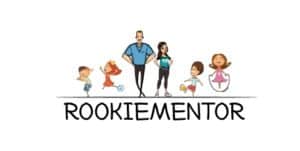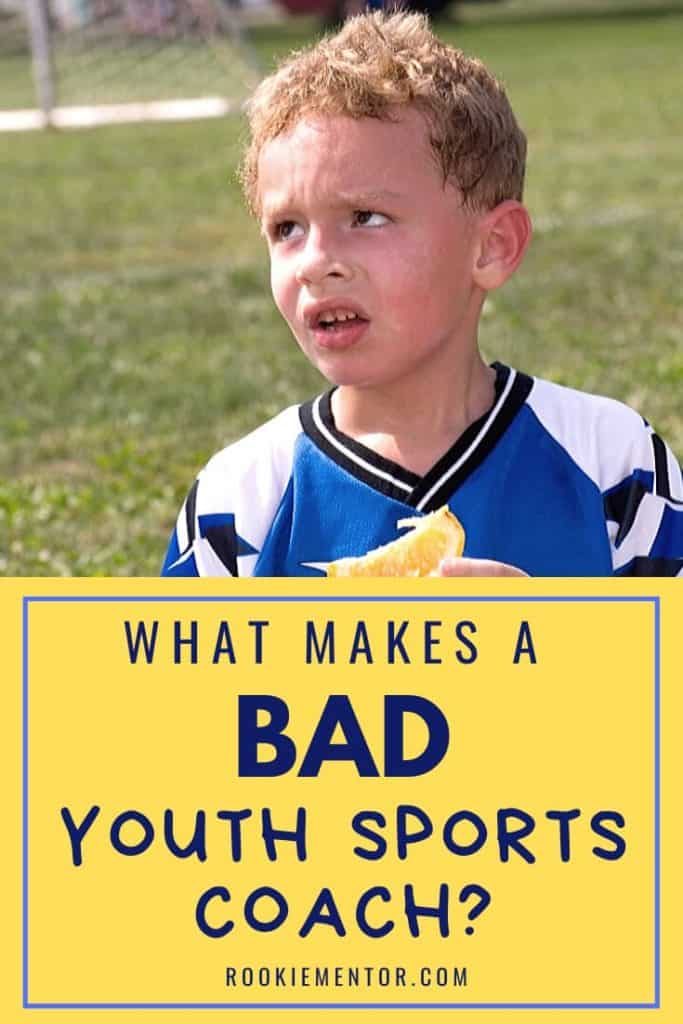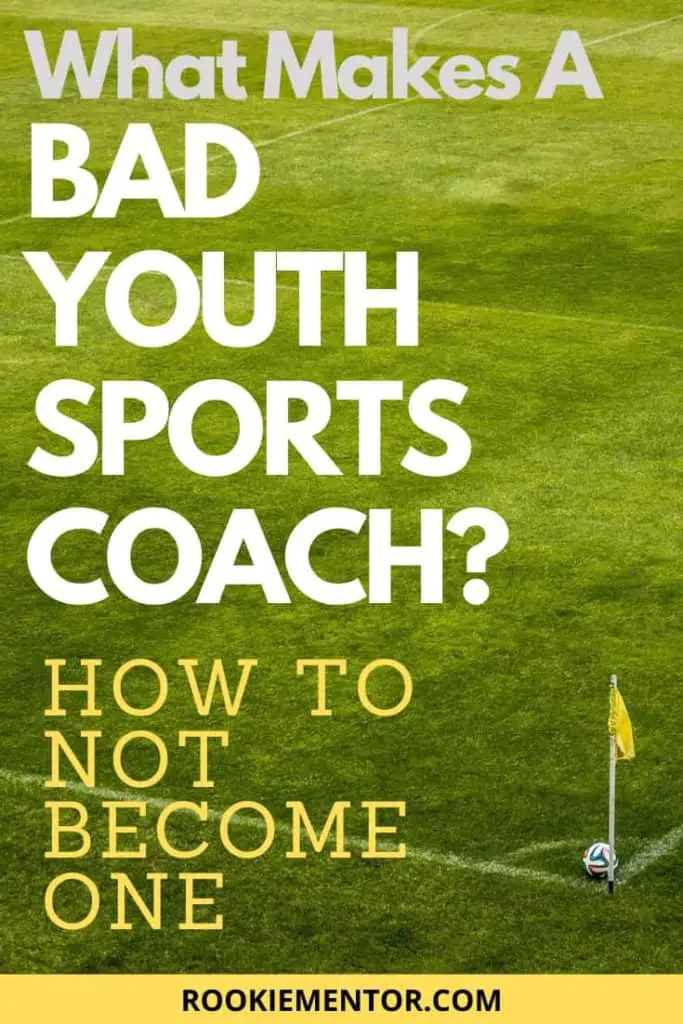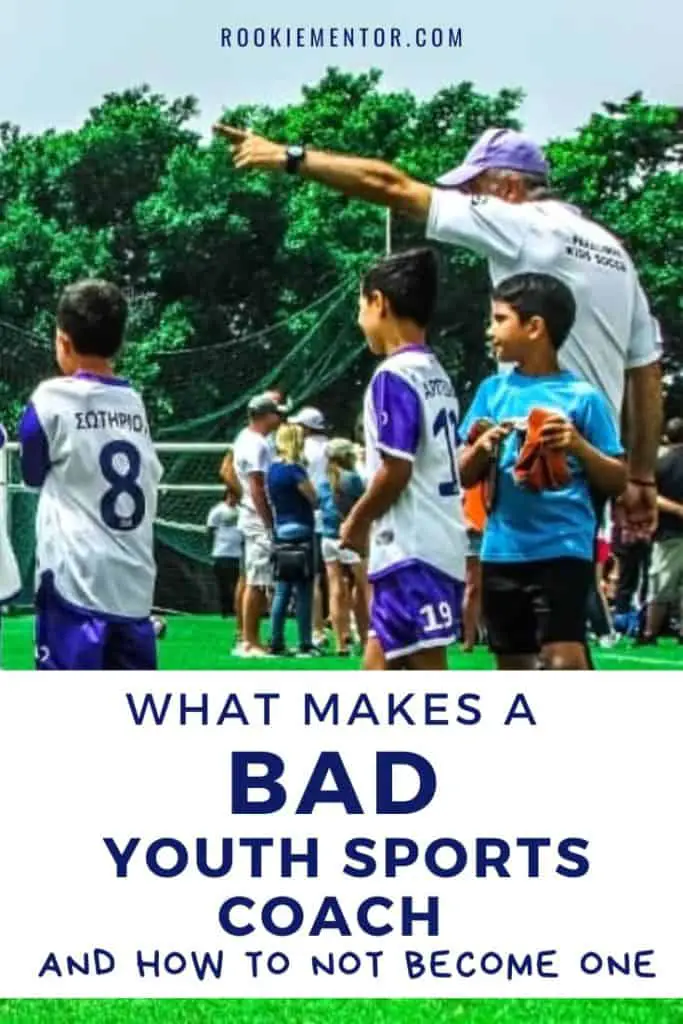Nobody wants to be labeled as the bad coach in youth sports. So how do you avoid this not so prestigious title and instead claim the privilege of being somebody’s “best coaches they’ve ever had” instead?
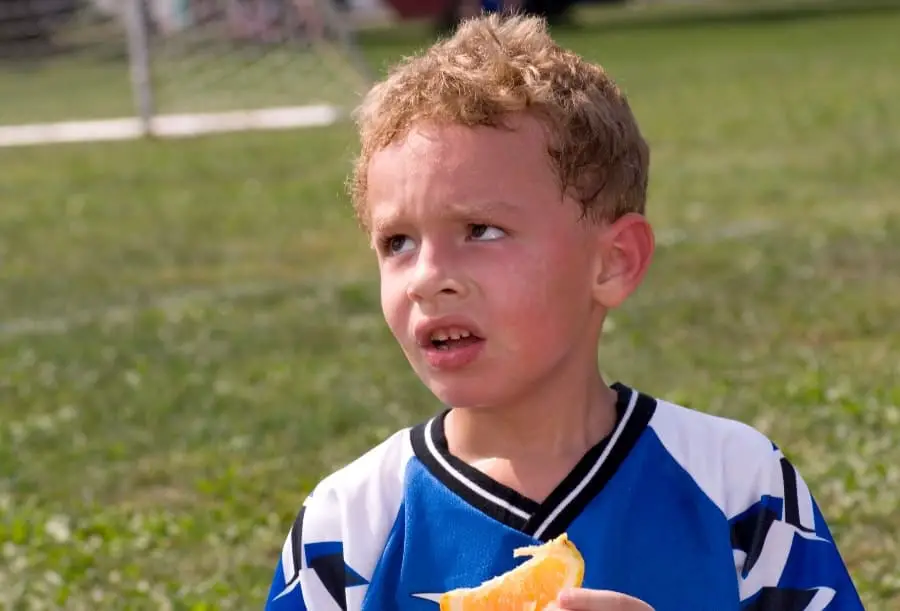
Every player, coach, parent and even the spectator in the crowd eating an overpriced hotdog, has their own thoughts and opinions on what is considered a “bad coach.” Some value equal playing time and positive team spirit while others appreciate a win at all cost mentality to boost their kid’s chance at a college scholarship. The point is, everyone has an opinion and you’ll never keep everyone happy.
However, the aim of this post is to bring to light the different aspects and opinions of what people may constitute as bad coaching and highlight ways you can avoid falling into the trap of being labeled a “bad coach.”
Favoring Particular Kids
Favoritism towards particular kids on the team is seen all too often in youth sports.
Often these kids are the most talented in the team or can sometimes be the child of the coach and there is the common belief that taking either of these players off and resting them will mean losing the game.
Favoritism, unfortunately, may also steam to other areas outside the game. Did the coach have a disagreement with another player’s parent at the local bar or at another child’s sports game a few weeks ago?
What’s sad about favoritism is often the actual kids playing the game have no idea why this favoritism is going on. They are not ignorant to understanding who is the “best” on the team, but they don’t understand why they are playing a lot more than them. Isn’t playing youth sports about having fun? Most kids don’t even care about winning anyway.
Children have no idea and don’t care who the coach is friends with and who they are trying to impress with a winning record. They cannot comprehend why their coach would act in a deceitful way, favoring particular kids just to win. It doesn’t make sense.
Tips to Avoid Being a Bad Youth Sports Coach
It’s natural to have “favorites.” There will be hardworking, kind and coachable kids in your team who you’ll want to clone. There will be superstars who demonstrate a natural talent for the game who will put points on the scoreboard for the team.
But your job is to treat, even your least favorite kids, with the same respect and playing time you treat everyone else. Are you putting your players in the “best position to win,”, well it depends on what you deem as winning? From a pure scoreboard perspective, sure, you might lose the game but do these 6 and 7-year-olds walk away from the game happy, with their head held high, knowing the had a chance to play and impact the game because they were given a chance? You bet.
Every youth sports coach, even the best, most experienced coaches in the world I’m sure have their favorites. But would the other coaches, the parents and the players on the team even know who they are? Probably not. This is the sign of a brilliant coach.
We recently published a post that dives into a lot more detail about favoritism and how it can be used in a positive way. I know it may seem a little contradicting but the title is called Why It’s Essential For Coaches to Have Favorites and is worth a browse.
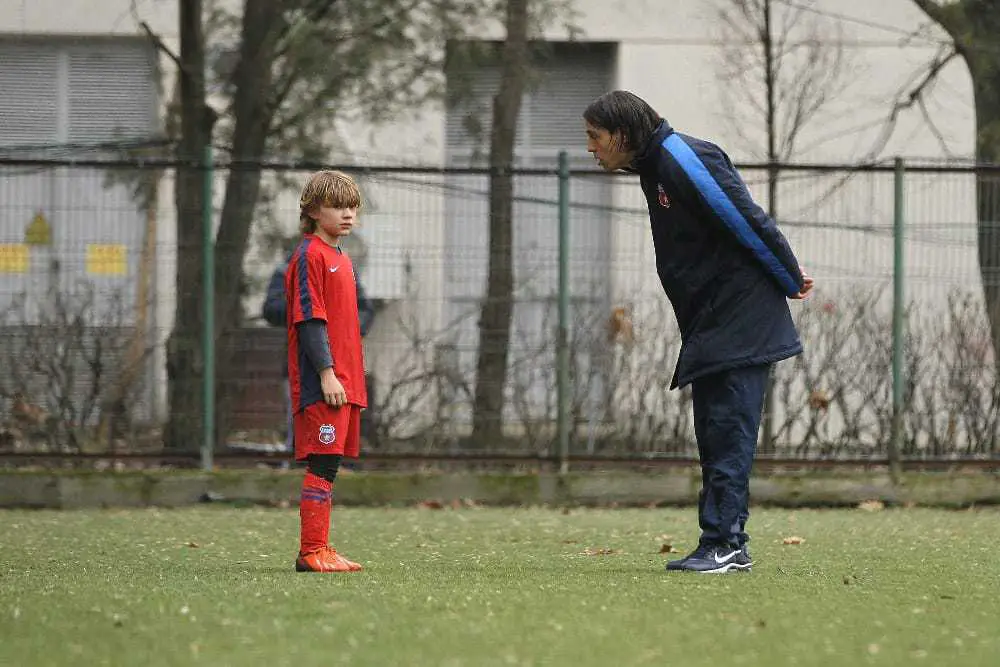
Lacks Key Knowledge About the Game
I remember my mom yelling out to me during a youth basketball game to “keep moving.” This was her favorite line. The issue was we were running an offensive play and it wasn’t my time to “keep moving.” I was waiting to screen a teammate so they had a better opportunity to score.
I remember looking at her, shaking my head and almost laughing because she was so passionate about me trying my best but her comments were just a bit off.
Now think about this same scenario, but instead of the comments coming from your mom, they were coming from the coach. You.
Can enthusiasm make up for lack of knowledge?
Do you really know the intricate details about the sport you’re coaching? Or were you thrown into the position last minute because the club was short and they needed somebody to just help out?
Do you know what advice to give your team when the game is on the line? While some would argue that at a youth sports level you don’t need such in-depth knowledge about the game because the kids are just learning and it’s not about winning, I tend to disagree.
I think it’s important from a confidence perspective to have the knowledge to teach proper skills and techniques from the beginning. We hear the words “overuse injuries” as a result of performing the same movement over and over again, but the rate of these injuries skyrocket when a bad technique is to blame.
Tips to Avoid Being a Bad Youth Sports Coach
- Expect more from yourself. As a player, you wanted a knowledgeable coach who could teach you new skills and help you understand technical aspects of the game right? Be this coach for your players, even if it takes effort.
- Be a sponge for information. Attend coach’s clinics, listen to podcasts, read books and watch YouTube videos about your sport. While a lot of the information may not be particularly relevant in youth sports, you are armed with this knowledge and confidence if questions and situations present themselves.
- Read Can You Coach a Sport You Never Played at the Youth Level? It’s an insightful look into this real issue I have personally faced myself.
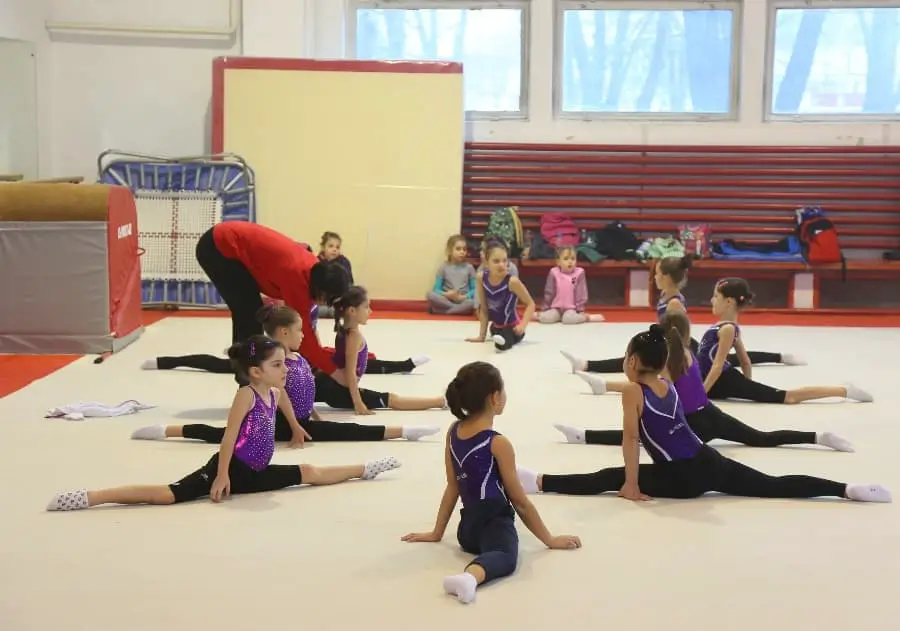
Disregard for Athlete Wellbeing
Similar to the “winning is everything” attitude, some bad coaches show little interest in player wellbeing.
These coaches have become obsessed with their winning record or dream of a winning record and won’t stop until they get there, even in a 10-year-olds little league game.
But what do I mean about disregarding athlete wellbeing?
- Encouraging athletes to play injured
- Ignoring kids when they complain of pain potentially due to overuse
- Allowing kids to play in unsafe, extreme conditions
- Forcing youth athletes to train 5 days a week or else they “won’t play”
- Quoting “practice makes perfect” and “if you stop training there is somebody out there not slaking off who will beat you”
- Not enforcing proper warmup, stretching and cool down principles into training and games.
Any of these sounding familiar?
I’m sure most of these coaches don’t intentionally mean to behave in this way. They don’t want kids to get hurt, forcing them to sit out for weeks at a time. And I’m sure they don’t want to cause overuse injuries from not allowing the kids to have adequate rest.
But it’s our job as youth sports coaches to be better. To listen even when the kids are saying nothing at all and to act responsibly, with integrity to protect our kids. Youth sport is about having fun so don’t confuse this with your desire to win, because there is no place for it here.
Related posts: When to Quit Coaching Sports?
Tips to Avoid Being a Bad Youth Sports Coach
- If a player complains of pain, even your most talented player, don’t assume you didn’t hear them, disregarding their cry for help. Get advice, involve their parent and have them checked out.
- Incorporate proper warmup, cool down and stretching into every practice and game. If the kids need to arrive at practice and games earlier to make this happen, then communicate this with the parent and start a new routine.
- Know and understand the league rules about weather precautions so there are no surprises when not so desirable weather is forecast.
- Read How Can Poor Coaching Cause Injuries in Youth Sports? which explores in more detail what you can do as a youth sports coach to avoid injuries for your players.
- Don’t train every night of the week. Consider the “1 Hour per Year of Age per Week” rule. For example, an 8-year-old child should not be training more than 8 hours per week (source)
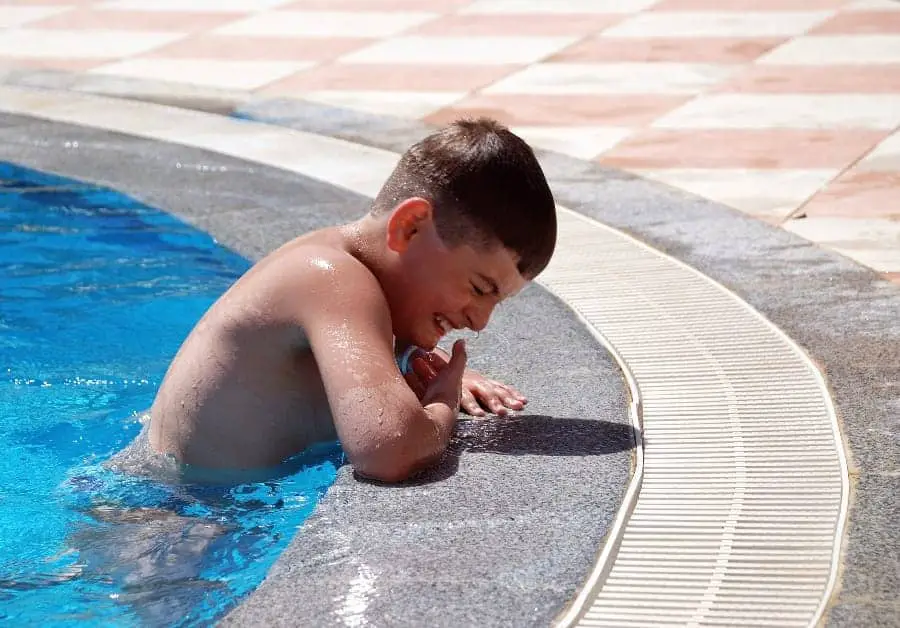
You’re Unmotivating
You may have the best, in-depth knowledge, the most impressive technical skills and a remarkable track record in your given sport, but if you can’t motivate your players to do their very best you’re treading the line as a “bad coach.”
Having the ability to encourage and inspire a group of young kids to defy what they think they can achieve is no perfect science and definitely not a skill every coach possesses.
But to be a successful, impactful youth coach who will be remembered as being a great coach, we need to find out what makes our kids tick. What gets them out of their bad mood from school and what makes them want to try their best for the team when the chips are down?
Tips to Avoid Being a Bad Youth Sports Coach
- Learn about your players. What do they like to do outside the game? Where do they like to go? What do they like to eat? Then use this information when creating new drills and even as a reward for good work. Think outside the box, they are kids, so have some fun with it.
- Think about what motivates you. Go ask your own kids and spouse what motivates them? Can you use these strategies in your coaching methods?
- Involve the parents. Ask them what get’s their kids fired up. Don’t be scared to look “inadequate” because you’re asking a question. Instead, most of the parents will probably appreciate you trying to connect with their child in a way other coaches wouldn’t bother.
- Can you organize a team bonding session away from practice, doing something totally different?
- Let the kids choose a few drills at practice. Take a look at What are the Challenges of Coaching Youth Sports? for other ways to keep kids engaged.
- Don’t confuse motivation with fear. Using humiliating, demeaning, disrespectful “teaching” tools can deflate and emotionally scar your athletes.
- Have a consistent message, don’t play “head games” and never play players off against each other.
I mentioned in another post titled, Coaches Guide to Managing Disrespectful Youth Athletes about avoiding the three L’s – laps, lectures and lines. Take a look at this post on now to avoid these three simple things for a much more enjoyable session.

Tolerates Poor Behavior
What do you do when a kid rolls their eyes or talks over you when you’re trying to explain something to the entire team?
And what is your reaction to a child on your team bullying another member, calling them horrible names and blaming them for a missed shot or a lost game?
Do you turn and look the other way and pretend you didn’t see it because it’s easier and you can avoid talking to their parents? Or do you stop these behaviors in their tracks?
Personally, a sign of a bad coach is one who doesn’t set clear expectations and ignores the need to set team rules at the commencement of the season. Basically opening the door for all sorts of bad behaviors like these.
I know some parents who think this is a waste of time stating we should be focusing on what’s really important – winning. But like we have mentioned many times before, and why this website is called Rookie Mentor and not Rookie Coach, we are more than just coaches.
We are developing strong, resilient young people who don’t put others down and treat people with respect regardless of skill.
Tips to Avoid Being a Bad Youth Sports Coach
- If you want to create a unified, respectful team that supports each other both on and off their playing arena, don’t be afraid to pull kids up and other coaches on poor behavior.
- Do not EVER allow players to disrespect each other. Address this issue immediately. Read Coaches Guide to Managing Disrespectful Youth Athletes on how to do this gracefully.
- Instead of instilling fear as a “tool,” create a safe environment for your players to learn and make mistakes. Instil confidence by being very selective in your choice of words and not simply your actions. Watch this TED talk below from a long term youth sports coach. His message is clear and powerful about how to communicate as a coach.
” Will you choose to only focus on those skills that will fade with that final whistle? Or will you also watch your words that will echo well beyond the game? ”
Coach Reed – TED TALK
Disrespectful
How would you like it if a colleague got up in front of the entire office and said you were the least productive, stupid moron that ever walked in this building? Then followed it up with jokes about your clothing style and how you wear your hair?
You would probably want the ground to open you up and swallow you, right? How to do you think these 6-year-olds feel when their coach or another athlete screams and yells things like, “You absolutely suck! You’re the worst basketball player I have ever coached and will probably ever coach for the rest of my life!”
Yeah, pretty awful.
“There is a line between being a tough coach and being a jerk”.
(source)
These kids have not yet developed resilience or built up the confidence to stand up to bullies. And even if they have and they are a little older, what gives you or any other person the right to belittle another human being that way?
Tips to Avoid Being a Bad Youth Sports Coach
- Lead by example and set the standard. If you preach team unity and positive reinforcement than you need to stop yelling blindly at your players and turn it into constructive criticism. Use specific examples and give precise goals for each player without simply saying “get better.”
- Don’t allow parents to be disrespectful towards their own kids or others on the team. This is a tricky balance sometimes and why we wrote an entire post explaining how to manage it with poise. Take a look here.
- Listen to your assistant coaches’ opinions. They are seeing the same game/practice/situation as you but potentially from a different vantage point. It’s amazing what you can discover when you start to look at a situation differently.
- If you are frustrated around why a player did or didn’t do something, pull that player aside after practice or a game and talk about it. Hear their perspective and give constructive feedback in a calm voice. Give them the confidence to see they are capable of reaching a different outcome.
“Your mission as a coach is to teach young people and help them grow as individuals so that they become better people in the world, both on and off the field“
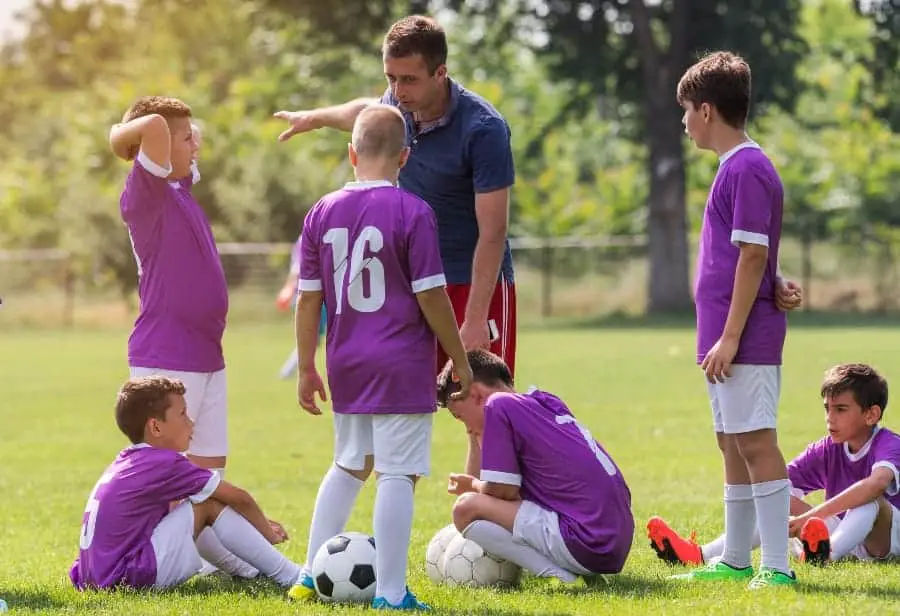
Not Encouraging Parent Involvement
As a youth sports coach, particularly one new to the sport or young in age, I know some parents can be really intimidating. I know you want to do everything in your power to avoid talking to them because they make you nervous and are likely to say something nasty in front of the other parents.
But not all parents should be thrown into this basket. Most parents are not “helicopter parents.” Most parents really do want to see their kids playing sports, smiling, having fun and fully respect your position as coach.
Youth sports coaches should embrace parents, even the intimidating ones, to participate positively in their kid’s sports and the club.
Tips to Avoid Being a Bad Youth Sports Coach
- Have “an open door policy.” Even without an office you can invite parents and athletes to communicate with you if they have any issues. Timing is important here so take a look at How Beginner Youth Sports Coaches Can Earn Player Respect to better understand how this works.
- Be proactive in your communication regarding any changes.
- Invite them to help out in the canteen, take admission fees at the gate on game day, help wash the uniforms and the towels etc.
- Help parents trust you by showing them your high level of engagement and commitment to being the best coach you can be for their kids.
- Act with caution. Not all parents have the same values and morals as you. Read: Obnoxious Youth Sports Parents: Your Role As Coach
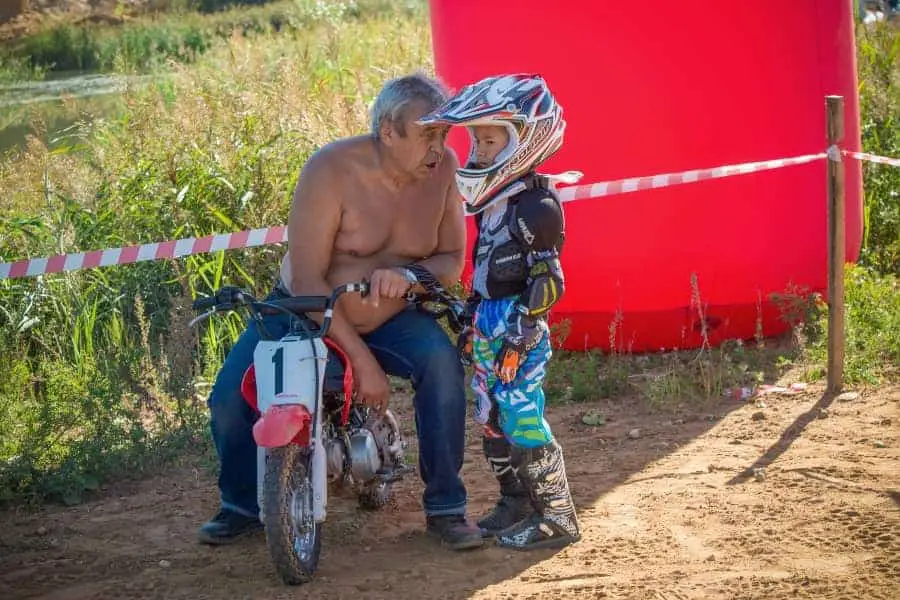
Summary: What Makes a Bad Youth Sports Coach? How to Not Become One
You can easily avoid becoming a “bad coach” if you honestly believe you are being one. But changes cannot be made or will ever be prioritized if you don’t see there is a problem within your coaching style.
Reflect on the main points of this post and consider if you could be titled as a “bad coach.” Does this annoy you? Are you shocked?
It is never too late to make positive changes to create a better environment for your team to flourish.
What do you think makes a bad coach?
Cheers,
Emma
